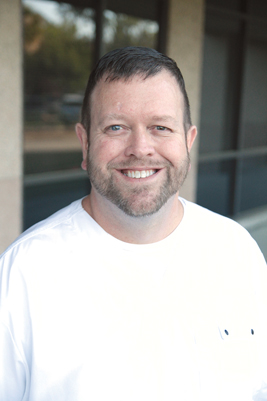As Patients Process Medical Information—And Their Emotions—Nurses Are There To Help
David Whidden, RN
Keys/Float Pool, 5 North, St. Joseph’s Hospital
DAISY Award Winner For Extraordinary Nurses
Smart Living: Patients and their families are given updates during their hospital stay that may include a lot of new medical information. How do nurses at St. Joseph’s/Candler help with this process?
David Whidden: Fundamentally, we remember to talk to our patients and not simply talk about or around them. Most of the people we take care of don’t have medical backgrounds. They may understand their own medical history, but when you’re in the hospital—especially if there are multiple disciplines or sub-specialties involved—there is a potential for information overload.

Our job at the bedside and as patient advocates is to help bridge medical jargon to the patient’s understanding of what is going on. Even when a physician is able to speak in lay terms, the information can be overwhelming. As nurses, we have an opportunity to slow down, talk to the patient, let them ask questions, and give them time to process everything.
When patients feel informed, they can confidently make smart choices about their care. Helping to break down the information can alleviate anxiety. We have to remember that acronyms and abbreviations on their own can be scary. For example, SBO. What does that mean? Small bowel obstruction. Okay, but still—what does that mean? As nurses, we have many opportunities to arm patients with information rather than making them feel vulnerable to it.
SL: So there is also an emotional component as well that nurses can help with?
DW: Yes, all patients want to be informed, but often they also want someone to show them that they understand, even if it’s simply holding their hand and saying, “Hey, I know you don’t want to be here, I know you’re having a difficult time. We’re going to help you get through this. You’re not alone.”
A nurse is a patient’s advocate, but we can also become their confidant. Not only with patients, but sometimes with their families, too. This is a journey we take with them. Helping families not get overwhelmed with information is part of great care and part of the relationship that nurses can form with patients and families. What they are going through tugs at your heart, but it is always fulfilling because you know you’ve made a difference.